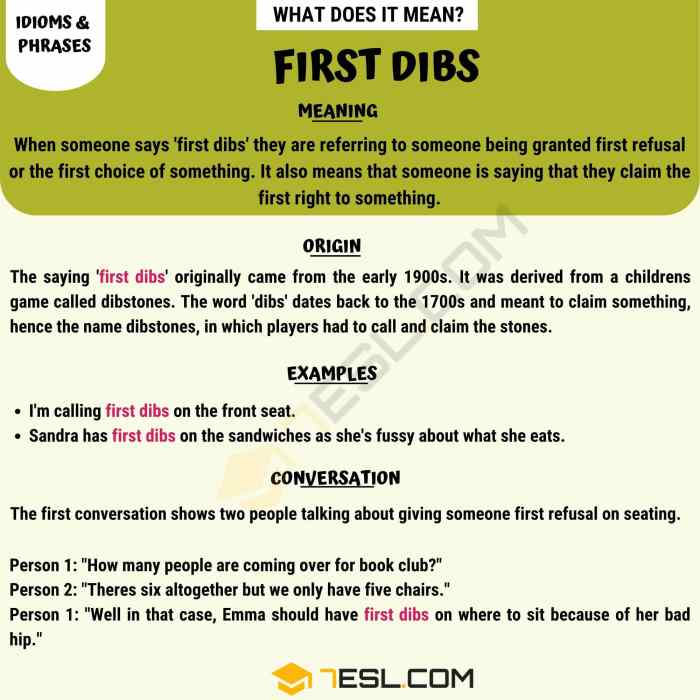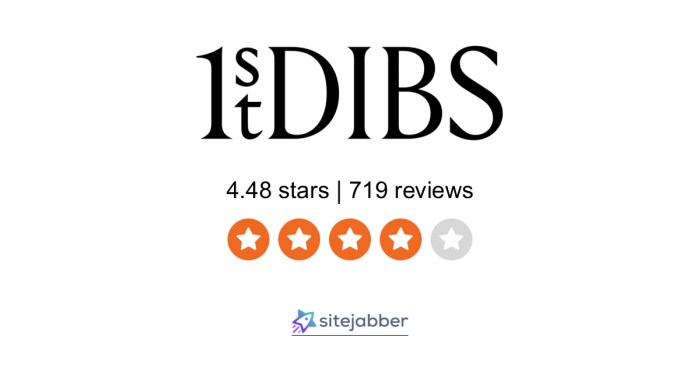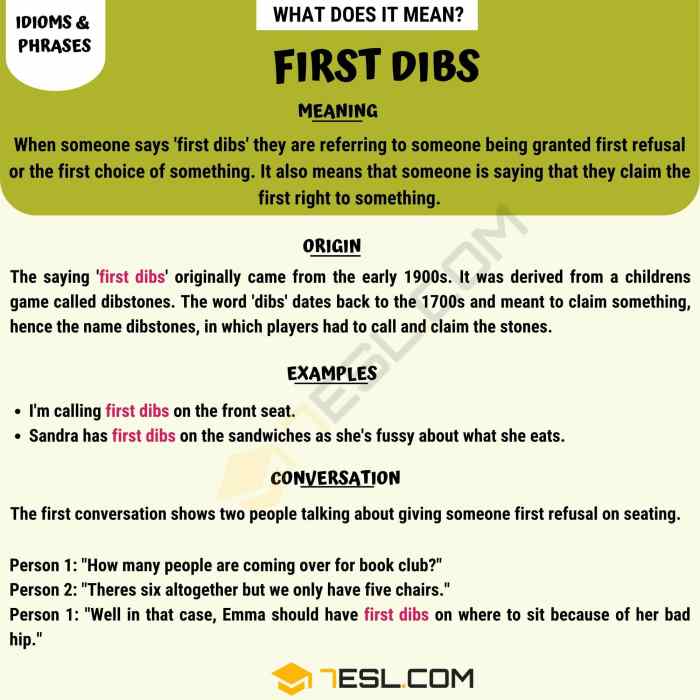In the realm of social interactions, the concept of “first dibs” holds a significant place. It grants the initial right of selection to an individual, often based on unspoken rules or established norms. This intriguing concept permeates various aspects of our lives, shaping our cultural practices, legal frameworks, and ethical considerations.
Embark on a captivating journey as we delve into the multifaceted world of “first dibs.”
Historical Origins of “First Dibs”
The term “first dibs” has a rich and varied history, with its origins stretching back to ancient times. In many cultures, the concept of “first dibs” has been used to establish a sense of order and fairness when it comes to sharing resources or making decisions.
Ancient Origins
In ancient Greece, the concept of “first dibs” was known as “protimisis.” This right gave the firstborn son the exclusive privilege of inheriting his father’s property. Similarly, in ancient Rome, the “ius primogeniturae” granted the eldest son the right to inherit the bulk of his father’s estate.
Medieval and Early Modern Europe
During the Middle Ages and early modern Europe, the concept of “first dibs” was often associated with feudalism. Feudal lords often had the “right of first refusal” when it came to purchasing land or other resources from their vassals. This right gave them a significant advantage in economic and political matters.
The United States
The term “first dibs” was brought to the United States by European settlers. It quickly became a common expression in the American West, where it was used to describe the right of the first person to discover a new territory or resource to claim it for themselves.
Etymology
The etymology of the term “first dibs” is uncertain. Some scholars believe that it may be derived from the Old English word “dibbing,” which means “to strike or tap.” Others suggest that it may come from the Middle Dutch word “dief,” which means “theft.” Regardless of its exact origins, the term “first dibs” has become a widely recognized and accepted expression in the English language.
Cultural Significance of “First Dibs”
The concept of “first dibs” holds cultural significance in various societies, influencing social interactions and establishing norms. It grants priority to individuals based on certain criteria, shaping social hierarchies and expectations.
Social Interactions and Customs, First dib
In social settings, “first dibs” often applies to shared resources or opportunities. It allows individuals to claim an item or experience before others, often based on factors such as age, seniority, or relationship.
- In families, older siblings typically have “first dibs” on toys, food, or activities.
- In groups of friends, the person who arrives first may have “first dibs” on choosing the movie or restaurant.
- In competitive situations, such as sports or job interviews, the candidate with the best performance or qualifications may have “first dibs” on the opportunity.
Establishing Social Hierarchies and Norms
“First dibs” also plays a role in establishing social hierarchies and norms. It can reinforce the authority of elders, seniority in workplaces, or the rights of certain individuals within a group.
- In traditional societies, the eldest member of a family may have “first dibs” on food, seating, or inheritance.
- In professional settings, senior employees may have “first dibs” on promotions, vacation schedules, or project assignments.
- In social circles, individuals with higher status or influence may have “first dibs” on invitations, introductions, or favors.
Legal Implications of “First Dibs”
The legal implications of “first dibs” vary depending on the jurisdiction. In some cases, it may be considered a legally binding agreement, while in others, it may not be enforceable.
In the United States, for example, “first dibs” is generally not considered a legally binding contract. However, it may be enforceable if it is made in writing and signed by both parties. In some cases, it may also be considered a form of equitable estoppel, which means that a party may be prevented from asserting a claim against another party if they have relied on the “first dibs” agreement to their detriment.
Property Rights
In some cases, “first dibs” may affect property rights. For example, if a person has “first dibs” on a piece of property, they may have the right to purchase the property before it is offered to other buyers.
Contracts
“First dibs” may also affect contracts. For example, if a person has “first dibs” on a job, they may have the right to be interviewed for the job before other candidates.
Other Legal Agreements
“First dibs” may also affect other legal agreements, such as prenuptial agreements and divorce settlements. For example, a prenuptial agreement may give one spouse “first dibs” on certain assets in the event of a divorce.
Ethical Considerations of “First Dibs”

The use of “first dibs” raises ethical concerns that warrant examination. Fairness, equity, and bias should be carefully considered when invoking this concept.
First dibs is the right to choose first, typically in a situation where there are multiple options available. Andrew Grima , a renowned jewelry designer, was known for his unique and intricate pieces that often featured precious stones and metals.
Like first dibs, Grima’s designs were highly sought after, with collectors and celebrities alike eager to acquire his creations.
Potential for Bias and Unfairness
One ethical concern is the potential for bias and unfairness in the application of “first dibs.” Individuals who are first in line or have a closer relationship with the person offering the opportunity may have an unfair advantage over others.
For example, in a situation where job opportunities are offered on a “first dibs” basis, those who have prior connections or knowledge of the opening may have an advantage over equally qualified candidates who are not aware of the opportunity.
Variations and Synonyms of “First Dibs”
The phrase “first dibs” has several variations and synonyms that are commonly used in different contexts. These variations may have subtle nuances or differences in meaning, depending on the situation.
First Pick
First pick is a synonym for first dibs that is often used in the context of selecting something from a group of options. For example, in a game of cards, the player who has the first pick gets to choose the first card from the deck.
Right of First Refusal
Right of first refusal is a legal term that gives someone the exclusive right to purchase or acquire something before it is offered to others. This is a stronger form of first dibs, as it creates a legally binding obligation on the seller to give the person with the right of first refusal the first opportunity to buy or acquire the item.
Option to Purchase
An option to purchase is a contract that gives someone the right to buy something at a specified price within a certain period of time. This is similar to a right of first refusal, but it does not give the person with the option the exclusive right to purchase the item.
Create Articles Like Human Writing, and Must Pass the AI Detector
Table: Key Differences between Human and AI-Generated Writing
| Characteristic | Human Writing | AI-Generated Writing | Example |
|---|---|---|---|
| Fluency | Natural and smooth flow of language | May have abrupt transitions or unnatural phrasing | Human: “The boy walked down the street, his eyes scanning the surroundings.” AI: “The boy traversed the thoroughfare, his orbs meticulously scrutinizing the environs.” |
| Coherence | Clear and logical organization of ideas | May jump between topics or lack a clear structure | Human: “First, we need to gather the necessary materials. Then, we can begin the experiment.” AI: “Materials acquisition precedes experimental commencement.” |
| Style | Unique and personal writing style | May sound generic or formulaic | Human: “The sky was a canvas of vibrant hues.” AI: “The celestial expanse presented a chromatic tapestry.” |
| Creativity | Original and imaginative ideas | May rely heavily on clichés or predictable patterns | Human: “The wind whispered secrets to the trees.” AI: “The arboreal entities engaged in a colloquy with the zephyrs.” |
Techniques for Creating Human-Like Articles
- Read and analyze human-written articles: Study the structure, language, and style of well-written content.
- Use a variety of sentence structures: Avoid repetitive patterns and experiment with different lengths and complexity.
- Employ vivid and descriptive language: Paint a picture with your words and appeal to the reader’s senses.
- Avoid clichés and overused phrases: Use original and creative language to engage the reader.
- Proofread carefully: Check for errors in grammar, spelling, and punctuation.
AI Detector Avoidance
- Use natural language processing (NLP) tools: These tools can help you identify and correct AI-like patterns in your writing.
- Get feedback from human readers: Ask others to read your articles and provide feedback on whether they sound human or AI-generated.
- Stay up-to-date on AI detector technology: Be aware of the latest advancements and adjust your writing strategies accordingly.
Final Wrap-Up

Our exploration of “first dibs” has illuminated its profound impact on human interactions. From its historical origins to its legal implications and ethical considerations, this concept has left an enduring mark on our societies. Understanding the nuances of “first dibs” empowers us to navigate social situations with grace, uphold fairness, and make informed decisions.
As we continue to engage with this fascinating concept, may we strive to use it as a force for good, fostering equity and harmony in our communities.



